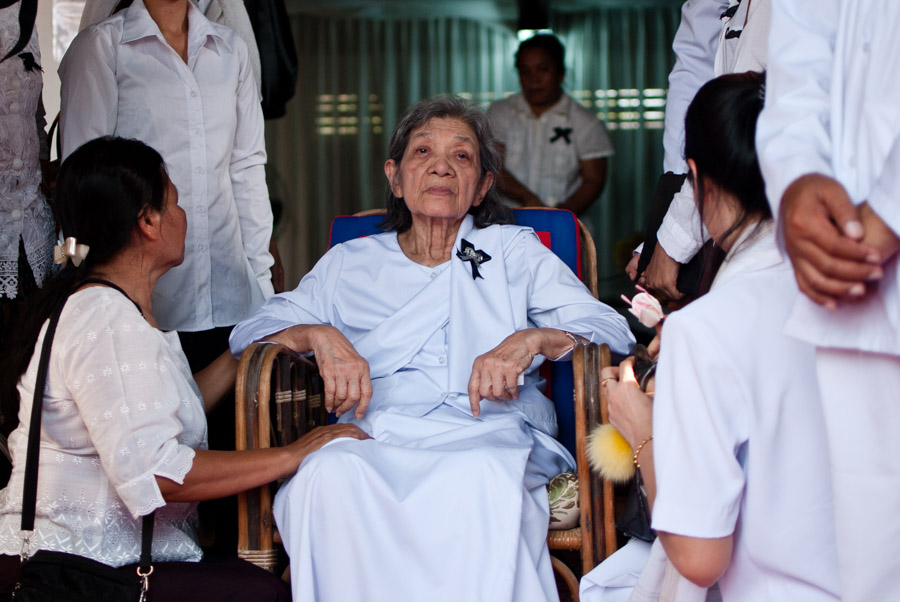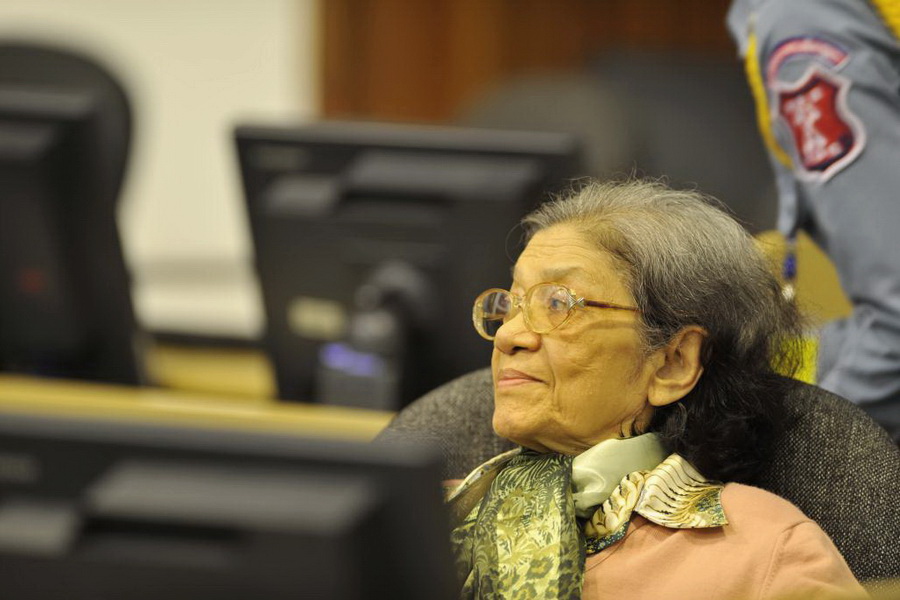Ieng Thirith, the highest-ranking woman in the genocidal Khmer Rouge regime, has died in Cambodia after a long illness, according to a United Nations-backed tribunal that is trying former regime leaders in Phnom Penh. A statement released by the court where Thirith, who faced charges of crimes against humanity, was deemed unfit to stand trial in 2012, shows she died Aug. 22 in Pailin, a former Khmer Rouge stronghold in western Cambodia near the Thai border. She was 83.
One of the few women ever to be charged with genocide, Thirith was deeply embedded in the upper echelons of the radical communist regime, which exterminated an estimated 1.7 million Cambodians between 1975 and 1979. She was the wife of the regime’s foreign minister, Ieng Sary, and the sister-in-law of “Brother Number One,” Pol Pot, who died in 1998.
Along with her husband, Thirith was among five surviving Khmer Rouge leaders facing justice at the Phnom Penh tribunal, known officially as the Extraordinary Chambers in the Courts of Cambodia. In 2012, proceedings against her were suspended after she was found unfit to stand trial due to progressive dementia. According to the ECCC statement, “She was released under a regime of judicial supervision [and] remained under judicial supervision until her death.”
Born to privilege
The daughter of a well-to-do provincial judge, Thirith was born into a life of relative privilege in the early 1930s. She graduated from Phnom Penh’s prestigious Lycee Sisowath and went on to study Shakespeare at the Sorbonne in Paris, where she became the first Cambodian woman to receive a degree in English literature. It was there that she married Ieng Sary, with whom she eventually had four children. Along with Pol Pot and his first wife, Khieu Ponnary, Thirith’s sister, the pair formed the nucleus of the communist movement that seized power in April 1975.
In “Democratic Kampuchea,” as the Khmer Rouge regime called itself, Ieng Thirith served as minister of social affairs, overseeing medical services and schools, which were severely lacking at the time. Though often dubbed the “first lady” of the regime, scholars say she was far from a mere appendage of her husband. “She worked her way up there because she believed in the revolution,” said Youk Chhang, director of the Documentation Center of Cambodia, which studies Khmer Rouge crimes. “She was not naive, but an active leader,” he added.
In his book Pol Pot: Anatomy of a Nightmare, Philip Short wrote that during a tour of Cambodia’s northwestern region in 1976, Thirith was “shocked” at the disastrous health conditions that the regime’s ruthless collectivization policies had brought about. Instead of calling for change, however, she reported to Pol Pot that the conditions were the result of “foreign agents” trying to undermine the revolution.
Friends in high places
After being driven from power by the Vietnamese army in January 1979, Thirith and her husband settled in the western province of Pailin, where they and the ousted regime continued to enjoy military and diplomatic support from China, the U.S. and the Association of Southeast Asian Nations, which backed them in a civil war against the new Vietnam-installed government in Phnom Penh. Sary subsequently built Pailin into a personal fiefdom, using proceeds from the export of timber and gems across the Thai border.
Short quotes a British ambassador who attended a lunch with the couple after the Khmer Rouge fell, likening the experience “to having tea with Rosemary West and her husband, two murderous sexual deviants whose names became a byword in Britain for grisly perversion.”
In August 1996, Sary defected to join the Phnom Penh government and was pardoned by King Norodom Sihanouk, after which the couple lived a comfortable life in a shady Phnom Penh villa, flying to Thailand regularly for medical treatment. They were finally arrested in November 2007 and handed over to the ECCC, which charged them with crimes against humanity, genocide, and grave breaches of the Geneva Conventions. Like her co-defendants, Thirith consistently denied any wrongdoing. In a courtroom outburst in 2009, she even said her accusers would be “cursed to the seventh circle of hell.”
“I have suffered a great deal and I cannot really be patient because I have been wrongly accused,” she said.
Ticking clock
Thirith’s death, which came after years of deteriorating health, will have little direct impact on the proceedings at the ECCC. But it underscores the urgency of the tribunal’s task in completing its vital second case before the remaining defendants are incapacitated.
Since its establishment in 2006, the ECCC has brought just one trial to completion: that of Kaing Guek Eav, better known as Comrade Duch, the chief of S-21 prison in Phnom Penh, who is currently serving a life sentence.
Of the four defendants charged in the tribunal’s headline case, known as Case 002, only two remain alive: 84-year-old Khieu Samphan, the Khmer Rouge’s former head of state, and 89-year-old “Brother Number Two” Nuon Chea, the regime’s chief ideologue. The tribunal scored a victory in August 2014, when both were found guilty of crimes against humanity and sentenced to life imprisonment in the trial’s first phase, Case 002/1, which dealt with Khmer Rouge’s evacuation of Phnom Penh in April 1975 and subsequent forced population movements. The verdict is under appeal. Meanwhile, Case 002/2, the trial’s second phase and the first to deal with the heart of the mammoth 772-page Case 002 indictment, is inching forward.
Dissension on the court
At the same time, the ECCC, a hybrid tribunal comprising U.N. and Cambodian judges, has been dogged by bitter disagreements over two possible future cases, Case 003 and Case 004, which have long been opposed by the Cambodian government. Prime Minister Hun Sen, himself a former midlevel Khmer Rouge military commander who defected to Vietnam in 1977, has publicly voiced disapproval of the new cases, which involve five midlevel regime leaders, one of whom is deceased.
In 2010, Hun Sen told U.N. Secretary-General Ban Ki-moon that trials beyond Case 002 were “not allowed.” His position has been echoed in the decisions of Cambodian judges at the tribunal, who have largely stopped cooperating with their U.N. colleagues to move the cases forward.
The disagreement flared most recently in March, when international co-investigating judge Mark Harmon charged Case 003 suspect Meas Muth, the former head of the Khmer Rouge navy, with crimes against humanity and war crimes.
Harmon was forced to bring the charges in absentia, after Cambodian judicial police refused to execute a warrant for Muth’s arrest. Police similarly failed to execute a warrant for the arrest of former district commander Im Chaem, one of the accused in Case 004. The Cambodian government argues that the warrants, issued without the signature of Harmon’s Cambodian colleague, You Bunleng, are invalid.
With the tribunal’s continued operation dependent on donations from fatigued supporters, the political sensitivity of the two pending cases leaves the future of the tribunal in doubt. But however the saga ends, the tribunal has enriched the historical record, providing reams of first-person testimony that could help younger Cambodians, two-thirds of whom are under the age of 30, come to grips with the reality of what engulfed their country in the 1970s.
Despite Ieng Thirith’s death, Youk Chhang hoped the verdict of history would endure, even if the former minister can no longer be pronounced guilty by a court of law. “She was brutal to her population and she was active in supporting the [Khmer Rouge’s] policy,” he said. “This should not be buried with her death.”
Published by Nikkei Asian Review, August 24, 2015





